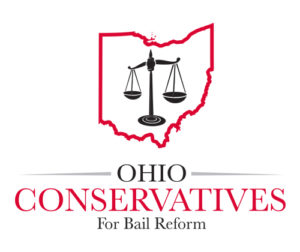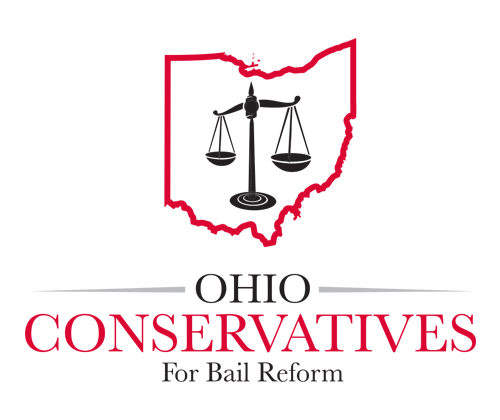Main Content
Ohio Conservatives for Bail Reform support bail reform for the following reasons:
Family and economic productivity perspective:
- Presumption favoring non-monetary release
There should be a presumption that favors releasing a person without a financial bond. This does not mean that a person will never have conditions placed on their release or that detention will never be ordered. What it means is that they will be released on the least restrictive conditions, which oftentimes means no conditions as all, and that the government should have to justify any further restrictions on a person’s liberty. - Individualized hearings within 48 hours
All arrested persons should be brought before a judicial official for an individualized bail hearing within 48 hours, if not released sooner. Spending just a few days in jail can have serious deleterious effects on a person’s life. Individuals are more likely to lose a job, housing, and parental rights. Individualized bail hearings that take into account the person’s individual circumstances and that occur within 48 hours make it less likely that the individual will suffer long term effects of being arrested and detained. - Ability-to-pay determination
Ability to pay determinations are special hearings to determine whether a person is able to afford a monetary bond. The theory behind monetary bonds is that they will incentivize individuals to reappear for their next court date if they have money on the line that they will lose if they fail to appear. However, often monetary bonds are set at an amount that is too high for many individuals to afford. When this happens people sit in jail because they can’t afford to post the bond. Ability-to-pay determinations are necessary to ensure that monetary bond amounts are tailored to each individual’s financial ability so that people may be released while the purpose behind the bond—incentivizing reappearance—is still realized.
From an individual liberty and due process perspective:
- Right to counsel
The right to counsel at bail hearings is necessary to ensure that every person, regardless of income, is given the requisite due process that the Constitution demands. Although some courts in Ohio provide access to counsel at bail hearings, most do not. That leaves a person without any legal representation at a critical juncture when their very freedom and right to release is being contemplated by the court. - Least restrictive conditions necessary to reasonably assure appearance and public safety
Every judicial officer setting bail should only order conditions that are the least restrictive necessary to assure future appearance in court and public safety. To do so, the judicial officer must conduct an individualized assessment and tailor the conditions, whether financial or non-financial, to that person’s unique circumstances. - Data collection and reporting
Collecting pretrial case information is important for understanding how the court’s pretrial system functions. Data collected should include: 1) conditions of bail, 2) demographic information, 3) how long a person spent in jail before release, 4) whether the person complied with conditions of bail, and 5) case outcomes. Each court should collect this information and report the results to the Supreme Court of Ohio so that courts across the state can know where improvements can be made and learn from each other where systems are working well. - Recorded findings justifying conditions imposed
To ensure that the least restrictive conditions are used, judicial officers should provide a recorded explanation for their release decisions, including any justifications for imposing the specified conditions (both non-financial and financial). Having a recorded justification of bail decisions provides due process protections to the individual and allows the person to challenge unnecessary pretrial detention at later bail review hearings or on appeal. - Cite and release requirements
People should not be arrested on accusations of committing a non-violent misdemeanor. Those accused of these low-level crimes should be given citations in lieu of arrest with a summons to appear in court on a specified date. These people should not spend time in jail and away from their homes, families, and jobs, waiting for a bail hearing. - No requirement of payment for non-monetary conditions
Any costs associated with non-monetary conditions such as day reporting, drug testing, counseling, electronic monitoring etc., should be borne by the court and not the accused. In some jurisdictions in Ohio the accused is required to bear the cost of what are technically supposed to be non-monetary conditions. This can result in a legally innocent person paying money to the court for monitoring that they will not get back even if the case is dismissed or they are found not guilty.
From a public safety perspective:
- Monetary conditions cannot be used for public safety
Monetary bonds should not be used as a means of assuring public safety. Too often courts set monetary bonds with the purported purpose of ensuring public safety. However how much money a person has is not a predictor of whether that person poses a threat to public safety and in Ohio monetary bonds cannot be forfeited for anything other than failing to appear. This is why non-monetary conditions, rather than monetary bonds, should be used when community safety is a concern. - Use of preventative pretrial detention
Ohio has a preventative pretrial detention statute that allows for the detention of any person accused of a felony offense who poses a substantial risk of harm to a person or the community. Courts seldom use the preventative pretrial detention statute opting to detain by using high bonds instead. This practice circumvents the due process requirements for lawful preventative detention and also can result in a person being released—even though they should not be—if they are wealthy enough to afford it. Accordingly, courts should preventatively detain a person who is considered high risk by using the procedures for doing so outlined in the Ohio Revised Code.



